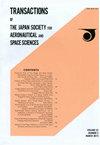气动导数蒙特卡罗评价的随机生成
IF 0.8
4区 工程技术
Q4 ENGINEERING, AEROSPACE
Transactions of the Japan Society for Aeronautical and Space Sciences
Pub Date : 2023-01-01
DOI:10.2322/tjsass.66.187
引用次数: 0
摘要
蒙特卡罗仿真(Monte Carlo simulation, MCS)由于能够对具有不确定参数的非线性系统进行随机、同步评估等优点,在飞行系统的飞前评估中得到了广泛的应用。一些气动导数和控制导数会对飞行器的飞行控制和性能产生重大影响,因此评估它们的不确定性对飞行器的影响具有重要意义。然而,将衍生品的不确定性适当地纳入MCS并不容易。导数是曲线的斜率,例如Cm -α曲线。为了在MCS中随机改变它,必须确定曲线上的旋转点。然而,随着飞行条件(如α)离旋转点越远,与标称曲线的偏差越大,这可能导致气动系数的方差过大。本文提出了一种利用不确定参数的协方差矩阵随机产生导数不确定性和偏置不确定性的新方法。将该方法应用于现有实验飞行系统的MCS,并将MCS结果与排除导数不确定性的结果进行了比较,以说明该方法的应用。本文章由计算机程序翻译,如有差异,请以英文原文为准。
Random Generation of Aerodynamic Derivatives for Monte Carlo Evaluation
Monte Carlo simulation (MCS) has been widely applied in the preflight evaluation of flight systems because of advantages such as its ability to evaluate nonlinear systems with uncertain parameters, which are incorporated into MCS randomly and simultaneously. Some aerodynamic and control derivatives can have significant effects on flight control and vehicle performance, so it is important to evaluate the influences of their uncertainties. However, it has not been easy to incorporate uncertainties of derivatives into MCS appropriately. A derivative is the slope of a curve, such as the Cm–α curve. To randomly vary it for use in MCS, the rotation point on the curve must be determined. However, the deviation from the nominal curve becomes greater as the flight condition, such as α, moves further from the rotation point, which can result in excessive variance of the aerodynamic coefficient. This paper presents a new method to generate derivative and bias uncertainties randomly using a covariance matrix of uncertain parameters. The method is applied to the MCS of an existing experimental flight system, and the MCS results are compared with a result that excludes derivative uncertainties to show how to apply the presented method.
求助全文
通过发布文献求助,成功后即可免费获取论文全文。
去求助
来源期刊
CiteScore
1.80
自引率
0.00%
发文量
18
审稿时长
>12 weeks
期刊介绍:
Information not localized

 求助内容:
求助内容: 应助结果提醒方式:
应助结果提醒方式:


